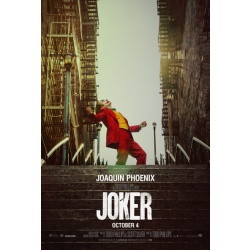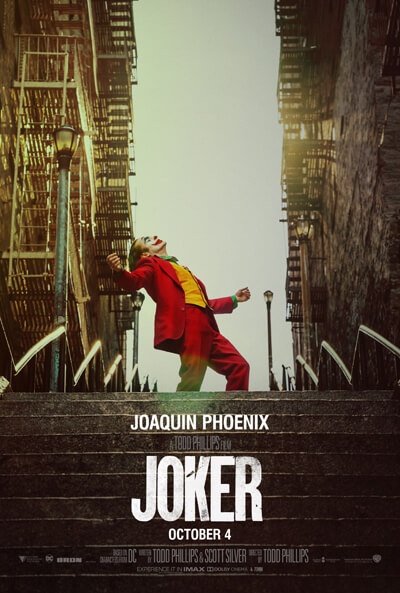
MOVIE REVIEW: "Joker" is a gritty, disappointing reheat of a familiar villain
(by decorahnews.com's Ben Gardner):
I wish I could recommend "Joker." I was skeptically hopeful it would live up to the hype and controversy. I admit, I was susceptible to the swirl of controversy and expectations surrounding the comic book adaptation. I've made my peace with this age of superhero movies, but nevertheless I'm thirsty for—to put it bluntly—better superhero movies. "Joker" had the opportunity to be such a movie, and it's certainly marketed as such.
Prior to the movie's release last week, "Joker" had created a storm of controversy. Mind you, this was before most people (besides critics and attendees at film festivals) had seen the film. The film is marketed by Warner Bros. as a gritty origin story of Batman's nemesis, but markedly different in theme and tone from other lighter comic book adaptations. The film stars Joaquin Phoenix as Arthur Fleck, a professional clown and wannabe stand-up comedian suffering from a myriad of societal woes. In time, he learns his true calling is enacting murderous vigilante justice.
The star, Joaquin Phoenix, has become one of his generation's most revered actors, and many filmgoers hoped the arthouse actor would provide much-needed depth and nuance to movie adaptations of comic books. Phoenix is known for being an intuitive and intense actor, and before the films premiere, journalists relished describing how much weight he lost for the role, as well as his "extreme" acting methods.
Controversy also swirled as law enforcement and community leaders began to worry about potential acts of violence inspired by the film, similar to a violent incident during a premiere of "The Dark Knight Rises" in the summer of 2012. Over the weekend, no violent incidents at movie theaters were reported.
These controversies are also expectations for "Joker." Many moviegoers and critics are thirsty for more artsy superhero movies, and "Joker"—starring an arthouse favorite and coasting off a big win at the Venice Film Festival—is being marketed as a thoughtful, brooding, and harrowing character study of a man variously oppressed by society. In short, "Joker" desperately wants to be "Taxi Driver" for a post-Trump era. The film's director and co-writer, Todd Philips, is obviously influenced by two Martin Scorsese movies about lonely white men suffering mental health problems: "Taxi Driver" and "King of Comedy," both starring Robert De Niro (who appears in "Joker" as a revered late night talk show).
Though it is competently made and Phoenix's performance is magnetic, the film on a whole is disappointing, primarily because the filmmakers seem unsure of what to make of Phoenix's character. The movie throws all sorts of social injustices on the bony shoulders of Arthur Fleck; yet as audience members, we fail to glimpse the inner workings of his mind in order to glean where his autonomy begins and societal pressures end. Some may argue, as a socio-/psychopath, the Joker character should be enigmatic. To that I'd respond: that's fine when he's the villain and limited to a supporting role; it's a different story when he's the lead. It's hard to sustain interest in a two-hour movie when your main character lacks subjectivity or an inner life. Or put bluntly: "Joker" needed a better script and director to artistically convey the absence of an inner life. ("Taxi Driver" and "King of Comedy" succeed in their portraits of isolated misanthropes, as does "The Master" from 2012, also starring Joaquin Phoenix in a similar brooding role.)
In addition to Phoenix's harrowing portrayal, there are some arresting visuals in the film. As well, the grit and grime of 1980's Gotham (a metaphorical mirror of New York City) is both authentically textured and eerily other-worldly. And
Phoenix's performance is by far the best part of the film. There's a scene early in the film where we see Phoenix's character hunched over, shirtless, exposing the ripples of his bony spine. I was reminded of a description in the recent Pat Barker novel "The Silence of the Girls": "As she bent forward her spine was shockingly visible under the pallid skin. You lift spines like that out of cooked fish." It's a great description in the novel and it's a fitting description of Phoenix's body-acting. Some of the best moments in the film are when the story slows and the camera lingers on his contorted body shape and his ethereal dancing movements.
Despite my disappointment with the film, it's making a lot of money and getting middling to moderately positive reviews. Over the weekend, "Joker" earned $96 million domestically, giving it the biggest October opening ever in the U.S. Worldwide, it's already made more than $300 million.
Who's laughing now, Ben?
Site designed and maintained by Iroc Web Design Services©.
Your Small Business Web Design Solutions.™


